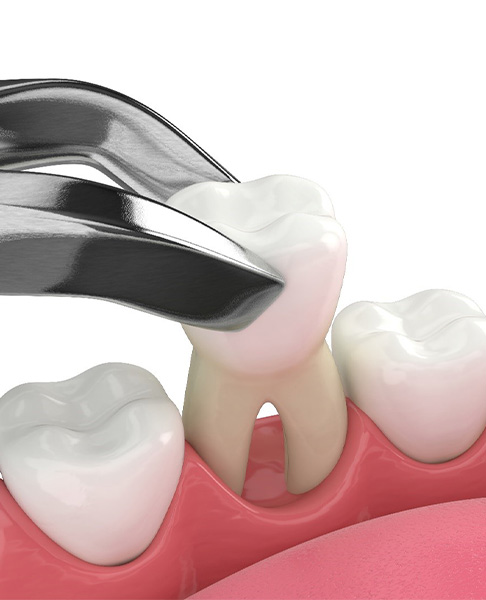Tooth Extractions – Dallas, TX
Put an End to Troublesome Teeth

No one wants to part with their teeth. Extractions are never your dentist’s first choice, but sometimes they are necessary to restore and maintain the health of the rest of your smile. When a tooth is damaged beyond the point of repair, it can cause problems in surrounding areas. That’s why at Lincoln Park Periodontal and Dental Implant Group, we offer tooth extractions in Dallas to put an end to troublesome teeth. If you think that an extraction would benefit you, give us a call to schedule a visit.
Why Choose Lincoln Park Periodontal and Dental Implant Group for Tooth Extractions?
- Board-Certified periodontist
- Advanced Dental Technology
- Dental Insurance Welcome
Reasons Why Tooth Extractions Are Necessary

We always do everything in our power to help patients keep their natural teeth, but sometimes it isn’t a viable option. Here are a few reasons why a tooth extraction may be necessary to restore your overall dental health and function:
- There is severe damage or decay to the tooth that is irreparable.
- To ensure the long-term success of a restoration – such as a denture.
- To allow for a patient to undergo orthodontic treatment.
- If a tooth is impacted and unable to properly erupt.
- When a primary tooth won’t fall out on its own.
By extracting troublesome teeth, future infections and other oral health issues are significantly less likely to occur.
The Process of Removing a Tooth

Teeth are generally removed by either pulling or surgical extraction. Teeth can only be “pulled” when they have fully emerged from the gumline. In this case, we will start by numbing the area around your tooth and use a clasping tool to shift the tooth around until it breaks away from the gumline. If pulling a tooth isn’t possible, the tooth will need to be surgically extracted. For this procedure, a small incision is made into your gum tissue to allow us the ability to reach enough of your tooth to fully remove it.
To determine which extraction method is necessary for you, come see us for a consultation where we can evaluate your smile. We will also discuss tooth replacement options, if needed, to prevent future oral health issues as a result of tooth loss.
Tooth Extraction Aftercare

Before you leave the practice, we will provide you with a specific aftercare plan to help you stay comfortable and avoid complications. Every case is different, but here are some steps we usually recommend for a comfortable, speedy recovery:
- Rinse with saltwater 24 hours after your procedure.
- Avoid using tobacco products until your mouth has healed.
- Elevate your head while sleeping.
- Get plenty of rest.
- Take recommended over-the-counter and prescribed medications as directed.
- Apply a cold compress to reduce swelling and discomfort.
- Stay away from hard, crunchy, and sticky foods.
Understanding the Cost of Tooth Extractions

As you consider tooth extraction treatment, you’ll likely want to know its price. That’s only natural – you must confirm if the service fits your budget. However, the cost of tooth extractions varies by patient. You’ll need to consult our dentists for a precise estimate. Our team will then strive to make your care more affordable. In particular, we’ll guide you through an extraction’s cost factors and payment options. Keep reading or book a visit to our office to learn more.
Factors That Can Affect Tooth Extraction Cost

Our dentists will give you an oral exam at your consultation visit. Doing so helps them grasp the affected tooth (or teeth), your smile goals, etc. From there, they’ll measure the factors that affect your extraction’s price. These things should include:
- Tooth Type/Location – Some teeth cost more to pull than others. For example, front ones are less expensive to extract since they involve fewer steps.
- Tooth Number – The number of teeth pulled will also affect treatment cost. As you get more extracted, your expenses will increase.
- Extraction Difficulty – Overall, a simple tooth extraction isn’t pricey. In contrast, a surgical one (i.e., one that involves tissue removal) can be costly.
- Tooth Replacement Options – You may need a tooth replacement following an extraction. The price of your treatment will rise in that case. The additional fees will depend on whether you get dentures, dental bridges, or dental implants.
Does Dental Insurance Cover Tooth Extractions?

Dental insurance usually does cover tooth extraction. Most plans see the treatment as a major procedure, so they consider it necessary. As such, they’ll often meet up to 50% of an extraction’s price. (Of course, this discount assumes you’ve met your deductible.)
All that said, some dental policies buck this trend. Your own plan may not cover extractions at all. On the other hand, it may only cover extractions of certain teeth. It’d thus be wise to confirm your benefits before treatment. Our team will help you do so as needed.
Other Options for Making Tooth Extractions Affordable

Dental insurance isn’t the only way to make pulling a tooth affordable. As a matter of fact, many dentists now offer financing options for their patients. Choosing the right kind will lead to more budget-friendly care.
For instance, consider us at Lincoln Park Periodontal & Dental Implant Group. Our office provides flexible financing through CareCredit – a reputable, third-party financier. With the latter group’s help, you could pay for an extraction in monthly installments. You’d then gradually cover the service’s price instead of all at once.
Our practice wants to make your tooth extraction easy, both for your smile and your wallet. Book a consultation today to learn how that would work!
Tooth Extractions FAQs

Tooth extractions can always be a point of anxiety, which is why we try and make the process as easy and painless as possible for our patients. However, it’s also great to want to learn more about the treatment you’re getting, so we’ll be happy to answer any questions you could potentially have.
If you want to learn a little bit more, here are answers to a few of the questions that we get often about this procedure.
What’s the Difference Between Tooth Extractions and Wisdom Tooth Surgery?
While both of them involve getting rid of a problem tooth, wisdom teeth surgery tends to involve, well, surgery. This allows teeth that are below the gum line or that are impacted to be removed, which isn’t usually necessary in the case of the typical tooth extraction.
Can I Leave the Space Empty After a Tooth Extraction?
Often when people have a tooth extracted they’re tempted to just leave the empty space in their smile, especially if it's one of the back teeth that’s been removed. However, your teeth do more than just look nice—you’ll have much more trouble talking and eating if you don’t have all of your teeth.
It’s also common for people who are missing teeth to have their jaw shrink as a consequence, which can negatively impact both your health and appearance. For that reason, we strongly recommend replacing any tooth you lose.
Can I Smoke After Getting a Tooth Extracted?
Tobacco smoke can irritate the gums and prevent healing after your tooth extraction, so it’s strongly recommended that you refrain from smoking after having your tooth extracted. You should make it a point to stop for at least five days, but ideally, you should avoid smoking for two weeks.
If you’re the sort of person who has had trouble quitting in the past, we’ll be happy to talk to you about some options that could potentially help you.
What Can I Do to Speed Up the Healing Time?
When you’re healing, the most important thing is to get some rest. Try to avoid strenuous activity for the first 24 hours after your treatment, as this can cause excess bleeding or open up your wound. You should also be sure to keep the gauze in place and avoid playing with the wound.
If you’re uncomfortable, be sure to stick to the medication we prescribe you. Certain over-the-counter medications, like aspirin, can thin the blood and slow healing. You can also apply a cold compress to the wound in order to bring down any swelling.
Does Getting a Tooth Extracted Hurt?
While you’ll likely feel sore after the anesthetic wears off, we’ll take every step to ensure you experience minimal discomfort during your tooth extraction. The local anesthetic we use is quite effective at numbing treatment areas, and we happily offer periodontal sedation for patients who are anxious or have overly sensitive teeth.
A few symptoms to be wary of during your recovery is worsening pain, aches that persist after one week, and signs of infection (such as fever or feeling sick). These are considered abnormal, and it’s important that you call us right away so we can help!
Is There an Alternative to a Tooth Extraction?
It depends on why you need a tooth extraction, however, you should know that this treatment is generally only recommended as a last resort option.
In cases where an oral infection is deep inside your tooth, a root canal can sometimes clean out the inner bacteria and save your tooth. Otherwise, a tooth extraction will effectively salvage your smile by preventing the infection from spreading. Periodontal therapy, meanwhile, could eliminate gum disease bacteria from your pink oral tissue, securing the support that keeps your tooth in place. If the tooth is already too loose to be viable, though, extracting and replacing it might be the best way to restore your oral function.
A tooth extraction will never be the first line of defense against oral conditions, but rest assured, if you do need one, it will benefit you in the long run.
How Should I Prepare for My Tooth Extraction?
Excellent question! One of the first things we recommend patients prepare for is to have reliable transportation to and from their appointment. Local anesthetics, IV sedation, and oral conscious sedation are strong enough to impair your driving abilities, so it’s best to arrange for a “designated driver.”
Another thing you can do to prepare for your tooth extraction is to make sure your medicine cabinet and pantry are well-stocked. Since you’ll likely be sore, it’s a good idea to have OTC pain relievers and soft foods readily available. Trust us – going to the store will probably be the last thing you’ll want to do after tooth extraction!
Finally, don’t hesitate to voice any questions or concerns you may have about your appointment. We want to make sure you feel confident in your treatment plan and will gladly talk about the process with you in more detail.
